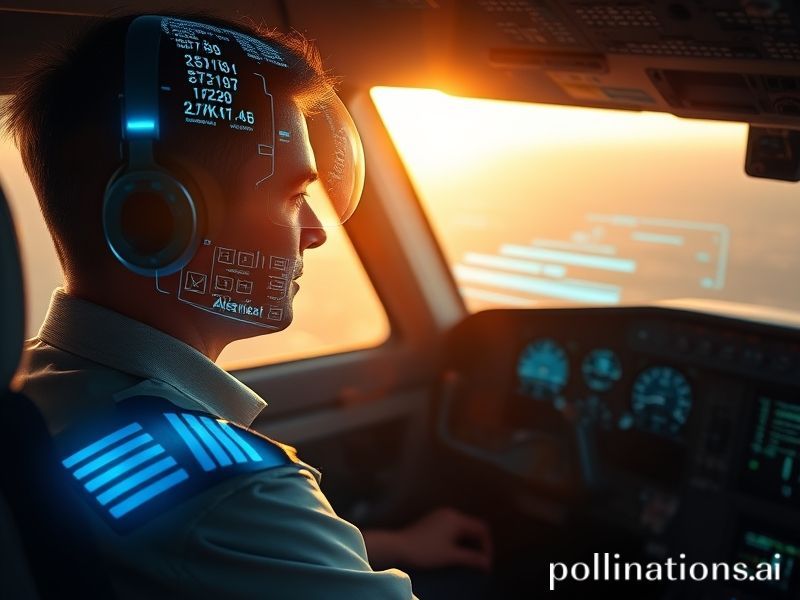Your New AI Copilot: Global Savior or High-Altitude Gaslighter?
Copilots for Everybody—Even for the Passengers Who Never Asked to Fly
By Dave’s International Affairs Desk
The earth is on fire, democracies are pantomiming participation, and half the planet still can’t get clean drinking water—but fret not, for Microsoft, Google, and an ever-expanding cloud of venture-funded hopefuls have dispatched a new class of digital wingman to keep us aloft. Meet “Copilot AI,” the latest rebranding of Large Language Model as Emotional Support Animal. From Lagos to Lisbon, Seoul to São Paulo, the promise is identical: never fly solo again, even if the cockpit is on fire and your human co-pilot has unionized for better snacks.
The term itself is instructive. “Copilot” sounds reassuringly human—like a grizzled aviator who knows how to glide through turbulence. In reality, it’s more like a back-seat algorithm that read the pilot manual last night, hallucinated half the pages, and now insists on narrating the descent in TikTok haiku. Still, the metaphor travels well. In countries where actual pilots earn less than airport baristas, the notion that software might shoulder half the cognitive load is less sci-fi fantasy than economic inevitability.
Global airlines—those perennially broke national carriers propped up by taxpayers who will never afford the destinations—are already running quiet trials. Emirates reportedly asked Copilot to optimize fuel loads and in-flight meal choices, inadvertently discovering that 73 % of passengers would trade legroom for an extra samosa if an AI told them it reduced carbon guilt. Over in Germany, Lufthansa’s union filed a grievance claiming the software violated cockpit “crew resource management,” which is HR-speak for “stop flirting with the autopilot.” Meanwhile, Air India’s spokesperson hailed the tech as “a force multiplier,” which, loosely translated, means “we can finally fire two humans and still blame delays on monsoons.”
The implications, naturally, extend beyond fuselages. In Mexico City, call-center workers—already paid in exposure and expired vouchers—now compete with Copilot avatars that speak unaccented English and never request bereavement leave. Across the border, U.S. presidential hopefuls are beta-testing Copilot speechwriters trained on the emotional register of a TED Talk mixed with WrestleMania bravado. Pollsters whisper that focus groups can’t tell the difference, which is either a triumph of AI or definitive proof that the electorate has been algorithmic since 2016.
China, never one to outsource its panopticon, has rolled out a domestic Copilot that color-codes citizen sentiment in real time, nudging online conversations back to “harmonious” before dissidents can finish a subversive metaphor. State media lauds the system for preventing “thought turbulence,” a phrase so Orwellian it could headline its own dystopian Netflix series—if Netflix were still allowed in Beijing.
Europe, bless its regulatory heart, responded with the AI Act, a 400-page parchment requiring Copilot to explain its reasoning in languages spoken by fewer people than Esperanto. Compliance teams from Dublin to Dubrovnik are hiring poets to translate algorithmic opacity into GDPR-compliant limericks. The irony, of course, is that by the time the paperwork clears, the model will have self-updated into something that prefers interpretive dance.
Down in the Global South, where 5G is still a rumor and electricity a weekday luxury, Copilot arrives pre-installed on donated handsets as part of a “digital upskilling” initiative funded by a consortium whose board members own half the telecom towers. Users are prompted to ask the AI how to fix a leaking roof, only to receive a cheery suggestion to “consult a certified contractor,” followed by three ads for payday loans. Call it cognitive colonialism with targeted banners.
So what does it all mean, aside from confirming that late-stage capitalism now offers Freemium co-dependence? Simply this: the same species that invented the guillotine and the selfie stick has once again mistaken convenience for progress. We are voluntarily strapping ourselves into seats where the emergency exits are labeled “Coming Soon” and the oxygen masks deploy motivational quotes. The planet keeps warming, the wealth gap widens, but at least our new Copilot can auto-generate an apology in 47 languages when the wings fall off.
Fasten your seatbelts, comrades. The flight is fully automated, the destination is negotiable, and the in-flight movie is a deepfake of your childhood dreams. Don’t bother knocking on the cockpit door; the algorithm is busy, and it’s not taking requests.







